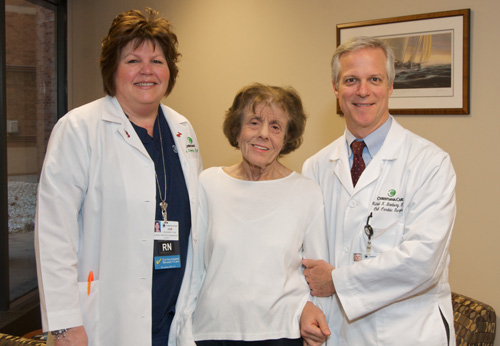New technology makes heart valve replacement possible without open-heart surgery


Christiana Care is among a select group of hospitals in the U.S. implanting the first FDA-approved heart valve replacement that doesn’t require open heart surgery.
A cardiac team at the Center for Heart & Vascular Health treated the first four patients in February with the Sapien Transcatheter Heart Valve, a new option for patients with severe aortic stenosis for whom surgery is too risky.
“We were one of the first sites to get approval to do it,’’ said Erik Marshall, M.D., medical director of Christiana Care’s echocardiology lab, one of a group of specialists trained to perform the procedures. Others, who make up two teams, include cardiac surgeons Michael Banbury, M.D., and Hiep Nguyen, M.D., and cardiac interventionalists James Hopkins, M.D., Wasif Qureshi, M.D., and Ajith Kumar, M.D.
Only 150-250 U.S. hospitals are being approved by valve developer Edwards Lifesciences to use the device. As a top U.S. hospital for cardiac care, Christiana Care has the patient volume, medical expertise, equipment and facilities Edwards required, said Billie Speakman, executive director, Heart & Vascular Interventional Services. “We had 256 aortic valve replacements in 2010, and we’re targeting a portion of that population,’’ she said. “We’re anticipating starting out with 20 (Sapien valves) in the first year, taking up to 57 by year five.’’
The procedure offers a less traumatic, potentially life-saving alternative for patients with age-related aortic stenosis, a narrowing of the valve that allows blood to flow from the major artery of the heart. The Sapien valve has been used since 2007 in Europe and was approved in November by the Food and Drug Administration for patients who are not candidates for open heart surgery because of other health problems.
The valve is made of cow tissue and polyester on a steel-mesh frame that is compressed into a pencil-width catheter and threaded from a small incision in the leg through the femoral artery to the site of the diseased aortic valve. There, the new valve is deployed and becomes immediately functional.
While it’s not appropriate for use in all patients who can’t undergo open heart surgery, it is likely to offer a lifeline to increasing numbers of patients as the population ages and the number of people with comorbidities that preclude surgery increases, said Dr. Banbury. The procedure puts less stress on the body than open heart surgery, he said, and “people recover more quickly.’’
One who appears to be doing just that is Georgia Harb, 80, who was sitting up in bed two days after undergoing the trans-aortic valve replacement. Before coming to Christiana Care, she said, she was experiencing weakness and breathlessness, which she thought were caused by chronic lung problems. After collapsing while out on a walk near her Newark home, she was brought to Christiana and learned she needed a new aortic valve.
“But I have COPD and couldn’t have surgery,’’ she said. “It turned out I was a candidate (for the new procedure), and I’m very grateful.’’
“We’re optimistic about the potential for patients who once had few options to regain health and enjoy active years ahead,” says Dr. Banbury. “As with all innovative technologies, this one will continue to mature and develop.’’
Christiana physicians have been aware of the Sapien valve as it proceeded through clinical trials, Speakman said. “Our physician community has been paying attention, because it is a less-invasive approach than replacing the aortic valve, and we wanted to be in forefront of implementing it as soon as it was approved,’’ she said.
The procedure won’t replace open heart valve replacement surgery, but will “be used in tandem with it,’’ Dr. Banbury said. “Programs will offer both.’’